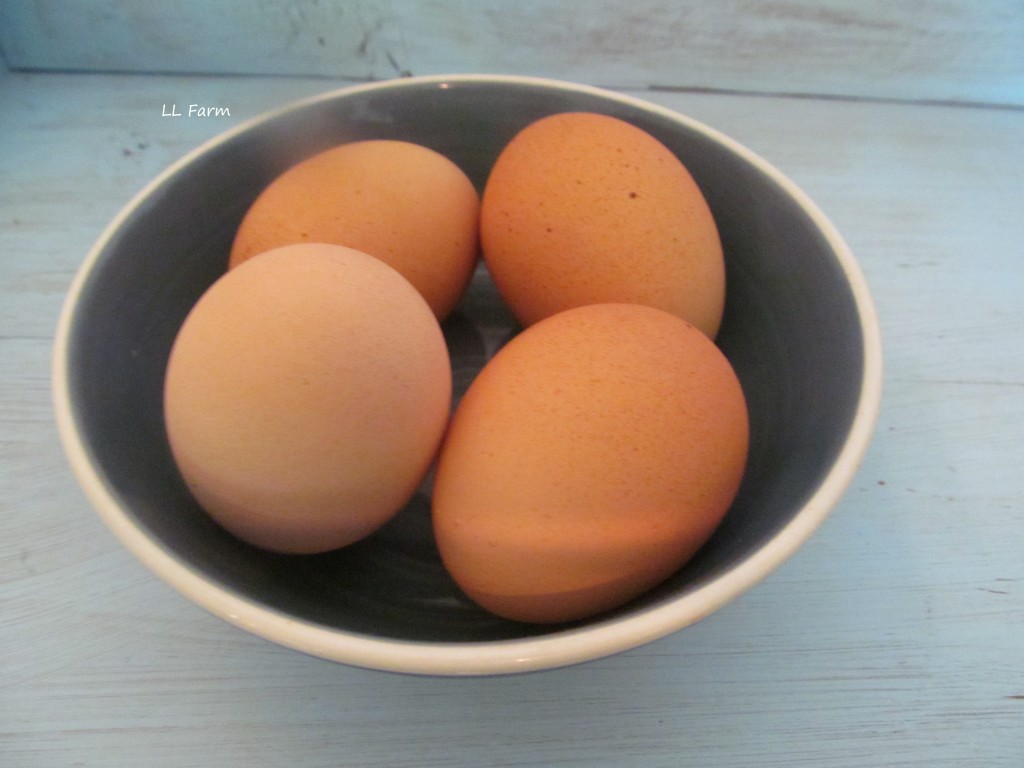
How to clean farm fresh eggs is a highly debatable topic…
Should I wash my eggs?
Warm or cold water?
Should I use soap, bleach, vinegar?
How to store farm fresh eggs is another topic that many people have an opinion on…
Should I store them in the refrigerator?
Should I store them at room temperature?
How long will they last?
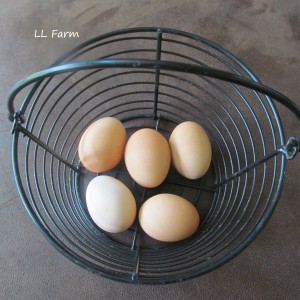
Before we discuss these questions, let’s start in the nesting boxes…how to start with fairly clean eggs in the first place.
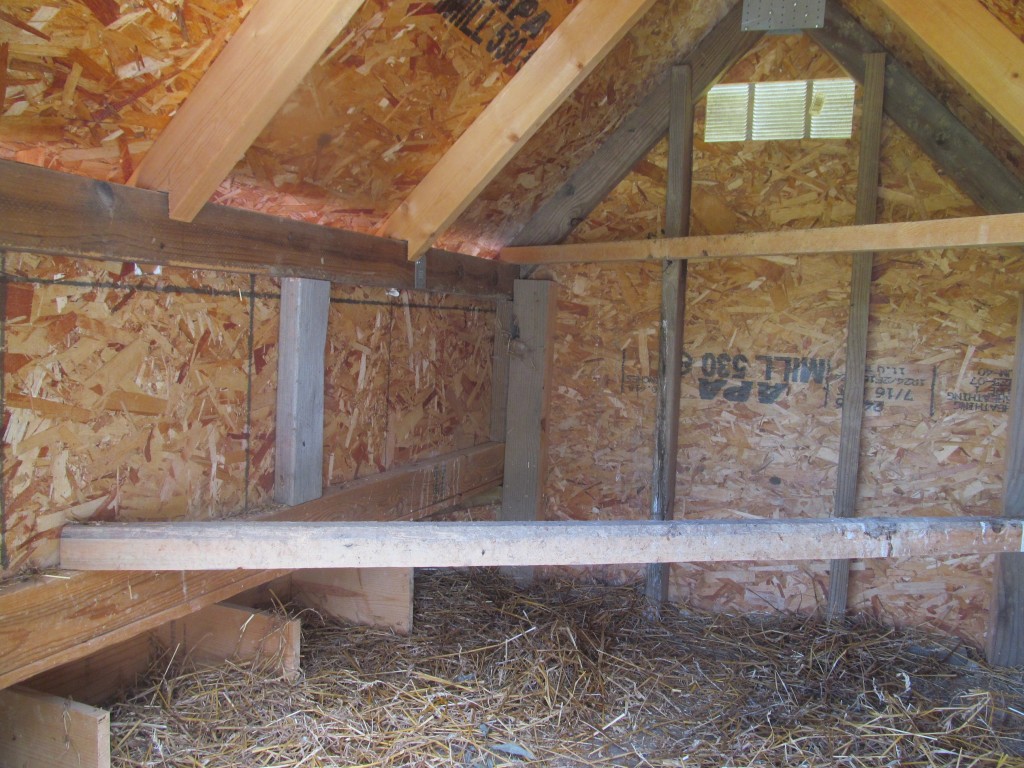
- The nesting boxes should be located away from the roosting area. Below where the chickens roost will be where most of their poo droppings are. Don’t let that be their nesting boxes.
- The nesting boxes should not be located near the coop door. The chickens will most likely carry in dirt or mud on their feet. A short walk through the straw bedding will help to remove some of that before they go into the nesting box.
- Keep the nesting boxes clean. Assume four hens per one nesting box. In reality though, most (if not all) hens will use the same box. You will be collecting eggs daily, so why not take a few minutes to freshen the nesting boxes up. Remove feathers, poo, dirt, and debris that may be in the boxes. Rearrange or add fresh straw as needed.
- Collecting eggs at least a couple of times a day will help to ensure cleanliness if the chickens are scratching around inside the coop.
Even with prevention in place, you are still going to get a soiled egg sometimes. So let’s talk about how to clean them.
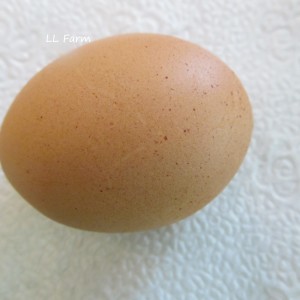
Have you ever touched a freshly laid egg? It feels a little wet. That is called the bloom. It is a natural, anti-bacterial coating on the egg shell that acts as a protector for the inside of the egg, not allowing bacteria to get in. Egg shells are porous, meaning that it is full of pores (tiny openings) that bacteria can get through.
Washing an egg removes some or all of the bloom (depending on which washing method you use). That is where the debate comes in. Some people only dry clean their eggs – paper towel, dry cloth, sandpaper, or even the good ‘ole fingernail. Others feel that they should clean their eggs with a damp cloth or paper towel. (We fall into this category.) While others clean their eggs under running water or saturate them in water.
So let’s discuss the washing options.
- Use warm water, not cold water. Warm water can cause the contents of the egg to expand against the shell, helping to prevent bacteria to enter through the shell. No need to use harsh soap, bleach, or vinegar…warm water is sufficient.
- Cold water can cause the contents of the egg to shrink, creating a vacuum that can pull bacteria into the egg through the porous shell.
- It is recommended to not saturate or soak eggs in water. If they are that soiled, it may be best to just trash it.
One of the best things about raising our own chickens is knowing what they are eating and therefore knowing what goes into the eggs that they lay. As chicken keepers, it is ultimately a personal decision for each of us as to how we clean our eggs.
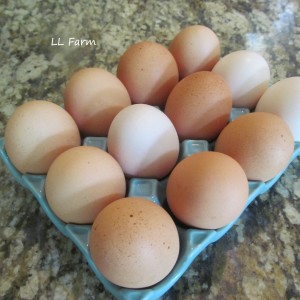
Now how should eggs be stored.
As a rule of thumb, I have been told that one day on the counter equals one week in the refrigerator. Storing eggs in the fridge does allow more shelf time, but depending on storage space and the number of eggs, this may not be possible.
Eggs can be kept at room temperature for several weeks. Think back to the days before refrigeration. As they probably did, we should eat those eggs within a timely manner. After all, isn’t that why we have chickens?













40 Comments
Hello,
My girls are driving me crazy because they poo so much in the nesting boxes and then lay the eggs right in with it. It grosses me out but hubby says just rinse drive and refrigerate….same as a clean egg. Is this true? I also wonder about the bleach spray after the washing…not finding anything saying to rinse that spray off or let it dry on
My chickens eat their own eggs sometimes when I have to work all day and can’t get the eggs in the morning. The rest of the eggs get wet with the innards of the egg they eat (the white and yolk in the box from being cracked and eaten). Are the other uneaten eggs that got wet with the other broken egg now bad because they go wet and bacteria could have gotten inside or are they still ok to save and eat because it got wet with the inside of another egg and not water. Is it considered an additional protective layer or should I throw them out? I’ve lost 8-10 eggs in one sitting sometimes because they got wet with the broken egg the chickens ate and spilled everywhere and I don’t know if they are bad because they got wet
Water Glass Eggs question.
I’m purchasing my free range duck and chicken eggs.
The bloom is still on and they are two weeks old.
Can I start storing them in freshly made Water Glass ?
What is the time limit to get the eggs in the water glass?
Tammi
Thank You for the information!!!! It was very helpful and answered many of my questions.
Take Care!!!
thanks for this
I wash my eggs with anti-bacterial soap and immedietly put them in the fridge. We cook our eggs completely to enjoy eating them. We have not gotten ill. People keep saying we are doing it wrong. Are we safe?
Can I use the warm water method if I am going to water glass them
“Nest run” is the name in the US for eggs that come out of the nest and are not washed. They should be clean, not cracked, and not have soft shells or soft spots on the shell.
Some states, like Florida, do not allow the sale or even gifted transfer of nest run eggs. Other states allow sale, but limit the number of hens on the farm. In Virginia it is 1000 hens, if I recall. Look this up on your state agriculture department website, or call your local ag department.
Nest run eggs do have to be refrigerated by the producer, but actually do not have to be refrigerated to stay safe for consumption, and are good for five weeks. In Europe they often do not refrigerate.
Washed eggs, even those recoated with a chemical to mimic the bloom, must be kept refrigerated, and are only considered good for three weeks.
Do not wash nest run eggs until you are going to use them. Once they are washed, do not store them for more than a few days in the refrigerator.
ALWAYS wash your hands after handling eggs, whether they are nest run or chemically treated.
On the farm, soiled eggs should be discarded rather than washed. If the egg is only lightly soiled, I will cook it to feed to the dogs or the chickens.
For nest run eggs, soiled is considered any material that can’t be gently brushed off or removed with a dry or very slightly dampened paper towel.
Never store the eggs wet.
I bought eggs from a farm. The date layed was two weeks ago. They said they washed the eggs with water as soon as picked then put them in cartons that they stack in basement. Would they still be safe to eat even though they were washed?
You should buy from a different farm — they are doing it wrong, and what they are doing is not considered safe. If they are not going to refrigerate the eggs, they should not wash them. Once washed, the eggs *must* be refrigerated immediately if they are to be sold.
Also, when you purchase eggs from a farm you should be getting eggs much fresher than 2 weeks old! We sell all of our eggs within a week of their being laid. It is part of the “fresh” in “farm fresh eggs”!
I was given a dozen fresh eggs from my niece who has chickens. They looked clean and still had the bloom on them. She told me to rinse them when I got home, dry them, and put them in the fridge – which I did. BUT… I rinsed them under the faucet using COLD water! Do I need to throw them out now. I hope not. There isn’t any information on the internet on what to do after this mistake. Thanks for any advice you can give.
Anna,
If you are going to refrigerate the eggs right after washing, you will be safe having washed them in cold water. The contraction of the egg contents away from the shell is pretty minimal, and refrigeration will significantly slow any bacterial incursions.
Can you use the same door to enter the roosting area and the nesting area ?
Same door for you or for the chickens? It will really depend on your set up. I use tractor coops, so there’s a large door for me, which also opens onto their run. The roosting area is the open part of the tractor. The nesting boxes enclose half of the tractor and are raised up so there’s a shelter under them from rain. There’s a small door that leads into the nesting boxes. Generally speaking, chickens like to lay their eggs in private. So having a door into a nesting area is nice for them. But not a requirement if that doesn’t work for your set-up. Good luck!!
We’ve been getting eggs for about a week now. I assumed they needed washed when they were brought in the house! So now I have 8 eggs, that have been washed in warm, soapy water, sitting on my counter. Should I toss them? Are they bad now that they’ve been washed and unrefrigerated? Help a new chicken mama out!
Hi Maggie,
I’ve been there as a new chicken mama. Welcome to the club!
If you wash your eggs, you need to refrigerate them. If you don’t wash your eggs, you can leave them out.
The washed eggs on your counter, if you don’t feel safe eating them, recycle them. You can put them in your compost pile. Or you could crush up the shells and mix that in with your chicken feed. Good luck!
I use paper shreddings to bed nest boxes…works great!
Loved the article! Thank you!
I’ve just started getting eggs from a friend and they are quite dirty.
My 90 yr. old mom grew up on a farm with laying chickens. She said their eggs were rarely dirty because the eggs rolled to a collection box as soon as they were laid. I wonder if anyone still uses this system?
If there happened to be a bit of something on the egg they used sand paper to rub it off.
I receive fresh eggs from a friend, but they’ve been refrigerated before I receive them. She doesn’t wash them and sometimes they are beyond gross – should I still wash with warm water or would you use a different method since they’ve already been refrigerated?
I soak mine in baking soda water the eggs i get are very soiled never had a bad egg yet been doing this a few years now
Thank you for the information. We have ducks; ducks are not tidy individuals. Ducks think, “my person loves easter-egg hunts in the mud”.
Hi i have a question I’m new to this also I have 4 Hens and one rooster. They have been laying eggs for about two months now what I been doing is when I see them I take them out wash them under warm water with dawn dish soap then dry them n put them in the refrigerator because they are very dirty am I doing this wrong are they safe to eat? I’m very new to this please help very worried now we haven’t eaten any yet only got about 2 dozen being it’s cold out.
HI Karisa,
Welcome to the lovely world of chickens. There are several ways that you can deal with the eggs. 1) Make sure that there’s lots of fresh straw or wood chips in the nesting box, this make help keep the eggs cleaner. If there’s a lot of mud in the chicken coop, you can also put down lots of straw or woodchips to limit the mud. 2) You, technically, don’t need to wash or refrigerate the eggs. When they come out of the chicken, they are covered with a surfactant, which helps protect the permeable shells from soaking in any bacteria or dirt. We keep our eggs (dirt and all) in a basket in the kitchen and only wash them right before we use them. You can come up with a system that lets you know which eggs are the oldest so you can use them first. 3) If you do prefer to wash them right away (lots of folks do), you can just use warm water and a scratchy sponge that you only use for washing eggs. No soap needed. Then dry them off and refrigerate them.
Chickens like light. They will lay more in the summer months because there is more light. In the winter, they are also using up more of their egg-laying-energy in keeping warm. You might add a little extra protein to their diet (like dried mealworms) to give them an energy boost.
Thanks for you questions and keeping looking through our articles; there’s lots of information designed to help new chicken owners.
Thank you for your information. I just boght farm fresh eggs.
Put warm water and a bit or plant based dish soap.
Washed them and rinsed in warm water.
Let them sit on the colander to dry before putting them in the cartons and refrigerator.
Could you sign me up for your emails?
Thank you
Hi…I’m new to farm fresh eggs and bought my first batch this week. I gave them all a quick wash in cold water due to some dirt and straw stuck to a few. I didnt know the washing rules being a somewhat city girl. Have I ruined them and do I have to throw them out now? Please email me with replies….thx
No need to throw them out Lisa. Once you wash the eggs, just make sure to store them in the refrigerator.
First time with chickens. My kids are super excited, today we had our first eggs laid. Eggs are very clean
Congratulations!
I sell my eggs without washing at all…. I wipe my fresh eggs with a paper towel. Any heavier material stuck on comes off nicely with a sponge that has a rough scrubbing side. This works better than sand paper: The sponge will eventually fill up with chicken coop dirt, and I just wash and let it dry overnight and it becomes totally dry. Sand paper is more expensive, not re-usable, and can be ruined by moisture such as a bit of rain getting in somehow on to an egg. We are in Oregon, and it is rainy here a lot!
I tell my egg buyers to use vinegar in a warm water bath just before use, and then to wipe clean with a paper towel or freshly laundered rag. It is just so we all feel safe. I also tell them to keep the eggs refrigerated rather than leaving them on the counter.
I use a combination of straw (cheaper) and shavings in the nest box. I put the nest boxes in a part of the coop that is the coolest place out of the sun so that the hens are comfortable and the eggs do not get hot when it gets into the 90s, as it does even here in Oregon a few times a year. Hens appreciate a cool quiet place to lay. I fixed the boxes so that the hay and shavings are less likely to fall out but the hens still can easily get in. I put some old picture frame material on at the bottom of each nest. It is strong and pretty and thin but won’t break with a hen sitting on it as she jumps in or out of the box.
Sometimes they get broody and sit on the eggs. To avoid this heating up the eggs (which are fertile) when I am not planning on having them raise some to hatch, I just take away their eggs and push them gently out of the nests.
To keep every thing cleaner and not smelly, I use the Deep Litter Method for the floors of all the coops.
Why water or damp wet your eggs when the “Bloom” is there coating and sealing the porous egg shell. Bloom, like water will saturate a egg shell pores not just coat the egg surface. “Sandpaper” can clean the surface and not hurt the bloom in the pores. Thats the whole idea behind it, longer storage with protection.
My Grandpa did it that way 70 years ago and was in the egg business. Nobody complained if the egg wasn’t 100% spotless.
R.
I use a spray bottle of listerine to get dirty spots off. Just a spritz and a paper towel to wipe down fresh eggs in general. Working well for me.
I use very warm water and a scrubbie pad to wash/rinse my eggs, I also use a produce wash from Biokleen, I find that it rinses off completely, and then I store my eggs in the fridge
Bad info! 1) Do not use straw in the nest boxes as chickens will scratch through it. Wood chip is much better. 2) Once you wash eggs they must be refrigerated, only unwashed eggs can remain at room temp.
before refrigerators, my Iowa grandmother used to store the eggs in a big crock sitting on the cold basement floor & it was filled with ‘water glass’ … a fluid something (?liquid sodium silicate) that would preserve eggs a long time. Anyone heard of it?
Tractor Supply has a cleaner for eggs. Yes the nest boxes need to be clean. I love my birds (girls).
Tonight I saw a fox running in my driveway. For sure I have to tighten my security. Good night friends.
I heard that coating the egg with mineral oil will allow the egg to be stored at room temp for up to 6 months. Any thoughts on this?
I’ve heard of doing this with paraffin, but never heard of mineral oil trick.
Please check out the MSDS, Material Safety Data Sheets, on Mineral oil.
Here’s a link to the MSDS Mineral Oil sheet for anyone who is interested. http://www.chemistry.mcgill.ca/msds/msds/8042-47-5.pdf